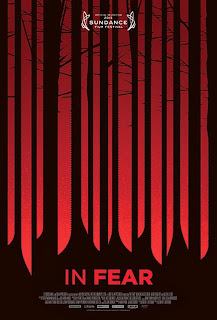In Fear (UK, 2013); Dir. Jeremy Lovering
Horror, perhaps more than any other, is a genre of simple pleasures. The same tried and tested formulas can be repurposed ad infinitum with a reasonable chance of decent renumeration, even in cases where a franchise should have long since succumbed to the law of diminishing returns.
For the discerning fan of horror cinema the devil is in the detail; how skilfully does a film plunder those too-familiar old tropes and, if not give the appearance of being fresh, at least demonstrate enough command of the material that the viewer doesn't think about it too much?
So to point out the influences on Jeremy Lovering's debut feature film would both spoil the plot and be somewhat glib, because there's no question that In Fear is as smartly directed piece of work that deserves an audience.
Tom (Iain De Castecker) and Lucy (Alice Englert), a young couple only a fortnight into their relationship, travel to rural Ireland for a music festival. En route to a nearby hotel they stop at a pub where Tom gets involved in a fracas with the locals although, crucially, the scenes takes place off camera and is reported to Lucy in the car after.
The hotel itself, supposedly situated somewhere amidst the remote woodland, proves impossible to find despite signs apparently pointing the way. As the pair find themselves driving in circles on the narrow roads and darkness descends frustration gives way to despair. Then the question arises of whether something, or someone, is watching them.
It's the claustrophobic weirdness of this first fifty minutes or so that really sets the film apart from similar fare. Like a video game where the player is uncertain how to proceed the narrative enters a torturous limbo with no obvious end in sight. Lovering deploys close-up camera angles - of the sort that have only really become possible in the past decade or so with digital cameras - to draw us intimately into the couple's predicament. Doubts begin to surface about how well they really know each other and what really transpired back at the pub. We're not even certain whether the cause of their confusion is human or supernatural; the car's satnav mysteriously unable to pinpoint their location.
When the third act changes the dynamic the effect ultimately proves a little disappointing. Classical aesthetics might have deemed an explanation was necessary but with that comes a dissipation of what made this film so compelling. Don't let that detract you from watching for yourself; In Fear is still comfortably the best British horror film since Kill List.
For the discerning fan of horror cinema the devil is in the detail; how skilfully does a film plunder those too-familiar old tropes and, if not give the appearance of being fresh, at least demonstrate enough command of the material that the viewer doesn't think about it too much?
So to point out the influences on Jeremy Lovering's debut feature film would both spoil the plot and be somewhat glib, because there's no question that In Fear is as smartly directed piece of work that deserves an audience.
Tom (Iain De Castecker) and Lucy (Alice Englert), a young couple only a fortnight into their relationship, travel to rural Ireland for a music festival. En route to a nearby hotel they stop at a pub where Tom gets involved in a fracas with the locals although, crucially, the scenes takes place off camera and is reported to Lucy in the car after.
The hotel itself, supposedly situated somewhere amidst the remote woodland, proves impossible to find despite signs apparently pointing the way. As the pair find themselves driving in circles on the narrow roads and darkness descends frustration gives way to despair. Then the question arises of whether something, or someone, is watching them.
It's the claustrophobic weirdness of this first fifty minutes or so that really sets the film apart from similar fare. Like a video game where the player is uncertain how to proceed the narrative enters a torturous limbo with no obvious end in sight. Lovering deploys close-up camera angles - of the sort that have only really become possible in the past decade or so with digital cameras - to draw us intimately into the couple's predicament. Doubts begin to surface about how well they really know each other and what really transpired back at the pub. We're not even certain whether the cause of their confusion is human or supernatural; the car's satnav mysteriously unable to pinpoint their location.
When the third act changes the dynamic the effect ultimately proves a little disappointing. Classical aesthetics might have deemed an explanation was necessary but with that comes a dissipation of what made this film so compelling. Don't let that detract you from watching for yourself; In Fear is still comfortably the best British horror film since Kill List.




Comments
Post a Comment